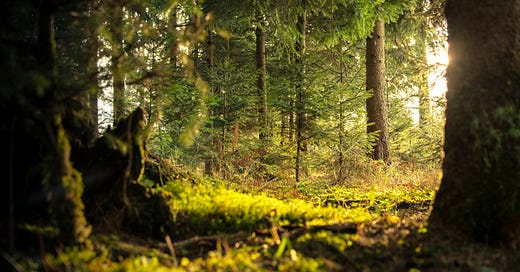"you are exalted above all the gods"
Psalm 97 is one of those passages where the henotheism of the ancient Israelites comes into view. The heavens are populated with gods but Yahweh reigns supreme over these lesser spiritual powers. As Psalm 97 says, the Lord is "exalted above all the gods."
This is a view that carries into the New Testament as well. For example, Satan is described as the god of this world (2 Corinthians 4:4). True, in both the Old and New Testaments the gods of the pagans are also described as demons. Regardless, gods or demons, the world teems with spiritual powers.
In my recent series on the fairy-faith of the Celtics peoples, in preparation for a class I'm teaching in Ireland, I discussed the Celtic experience of the natural world as suffused with spiritual agency. This animistic view of the natural world is common to paganism, then and now. Traditionally, these beliefs have been alarming to Christians. The spiritual worldview of paganism tempts us into the idolatrous and the demonic. And no doubt that is a Biblical concern. And yet, Scripture also describes how these spiritual powers have been tamed and brought under the lordship of Jesus. From Colossians 1:
He is the image of the invisible God,
the firstborn over all creation.
For everything was created by him,
in heaven and on earth,
the visible and the invisible,
whether thrones or dominions
or rulers or authorities—
all things have been created through him and for him.
He is before all things,
and by him all things hold together.
He is also the head of the body, the church;
he is the beginning,
the firstborn from the dead,
so that he might come to have
first place in everything.
For God was pleased to have
all his fullness dwell in him,
and through him to reconcile
everything to himself,
whether things on earth or things in heaven,
by making peace
through his blood, shed on the cross.
In the words of Psalm 97, Christ is exalted above all the gods. What this vision opens up is what might be called a baptized paganism. The spiritual powers and potencies of paganism indeed exist. But these agents hold no power or terror for they have been conquered, reconciled, and brought under the lordship Christ. This baptized paganism is the vision C.S. Lewis shares in The Chronicles of Narnia. Narnia is full of nature spirits and pagan gods. These spirits and gods were created by Aslan and they are submissive and obedient to his rule and command. Lewis fuses paganism and Christianity. The natural world is suffused with spiritual agency. The nature spirits exist. But the Lord is exulted above all the gods.




Tuning to Esther de Waal's work is helpful when exploring the Christian Celtic aesthetic. In her work she speaks of the 'Interconnectedness' of the physical and spiritual realms and how that shaped and formed the 'Peregrinatio' aspect of the faith. I think the harmonic legacy of the Fairy-Faith goes back much deeper even into the Pleistocene-Neolithic and Holocene Epoch where the ginormous receding ice shelves began to reveal a blooming resurrected landscape teaming with the energy of life. Those who erected the cromlechs and henges left us a structural testament to their experience. For their descendants, the Incarnation was a kind of 'Anthropological Teleios', where the unification of flesh and spirit mysteriously wove their world view together. You see this beautifully represented in the patterning and motifs of Celtic knot structures where Pagan and Christian symbolism are symbiotically combined.
This is essentially what I believe…I believe what I call the Divine or the One (the term God tends to make other pagans resistant to what I have to say, so I have found by using terms from Neoplatonism I am better able to communicate in that community) is the actual creator, ground of being, and the deity recorded in the Tanakh and New Testament under the various Hebrew divine names. I believe the rest of the gods are basically emanations (in the Neoplatonic sense) or ways of the Divine expressing Themselves in various modalities. Reality is complex and the Divine clearly loves variety and exuberant creation, so They express Themselves and Their will in the world as many deities just as they express Themselves and Their will in the world as many objects, properties, and relations within physical reality.